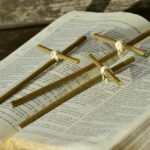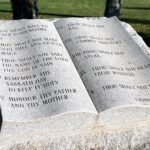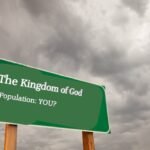Today’s “Christianity” keeps for its festivals Christmas, Easter, Halloween, Lent and various other days. But are these days Biblical and what Holy Days did the early first century apostles keep? The history of God’s annual Festivals and His Holy Days are found extensively in both the Old and the New Testament and in secular histories. God’s days do NOT include Christmas, Easter or Halloween. God’s Holy Days are outlined in Lev. 23 and they are “holy convocations” (vs. 2), the Sabbath Day (vs. 3), Passover (vs 5 a festival, not a Holy Day), Unleavened Bread with Holy Convocations on the first and last day of the 7 day festival (vs.6&8), Pentecost (vs.16), Trumpets (vs.24), Atonement (vs. 27), Tabernacles (vs.34) which is kept for 7 full days followed on the eighth day by, The Last Great Day also called by some the “Day of Sacred Assembly” (vs. 36,39). These are the days God calls Holy.
These days have been kept by God’s people since the beginnings of mankind. They were kept by the early first century Christian Church and will be kept in the future Kingdom of God. A short summary and history of these days include.
Pre-Mosaic: Gen. 18 and 19 Sodom and Gomorrah occurred on Passover and the 1st day of Unleavened Bread. Gen. 22 Abraham to sacrifice Isaac as a type of Passover lamb of Christ. Gen. 26:5 Abraham kept all of God’s law and commands.
Moses to Joshua: Ex. 12:1-14 Passover is ALWAYS kept on the 14th day of the first month. Ex. 34:22-23; Lev. 23 all; Josh. 5:10-11; 6:4; 24:29-31. Deut. 16 all.
Post Mosaic to the Babylonian Exile: I Kings 8:2 (Tabernacles), 57-59, 65-66; II Chron. 7:4-11.
Post Babylonian captivity to the year zero: Ezra 3:1-13; Neh. 8:1-18.
Early Christianity to 325 A.D.: As Jews both Jesus and the disciples kept the Holy Days. Did the early church and the apostles continue keeping them after the death and resurrection of Jesus? Yes they did but with more understanding of their full meanings and how they show the entire plan of God for mankind’s salvation. Acts 2 Pentecost. I Cor. 5:7-8 unleavened bread. I Cor. 11:17-34 Passover and Unleavened Bread. I Cor. 15:50-53 (Symbolic of Trumpets); 16:8(Pentecost); I Thes. 4:14-17 (Symbolic of Trumpets); Matt. 24:24-31 (Trumpets); Rev. 8, 9 and 10 (Trumpets); 11:15-19 (Trumpets); Acts 27:9 (Atonement); II Cor. 5:10 (Last Great Day); Rev. 20:11-15(Last Great Day). These previous verses show the meanings of the Holy Days. Polycarp, disciple of the Apostle John kept them and went to Rome and confronted Bishop Anicetus about keeping the Passover and not Easter. Polycrates, disciple of Polycarp went to Rome in the A.D. 190’s and confronted Pope Victor about the Passover being God’s way and Easter being sinful and pagan. Polycrates was temporarily excommunicated by Victor. In 325, Constantine ordered all “Christians” to keep Easter rather than God’s appointed Passover on the 14th day of the first month.
Future: In the future Kingdom of God the Festivals will also be kept. Zech. 14 all; Isa. 11 all; Isa. 27:13; Isa. 35 all; Hosea 12:9 and Micah 4:1-7.
The annual Holy Days of God show His plan of redemption from sin and salvation for all mankind.
For further study see each individual one page article on the Festivals of God’s Holy Days.


